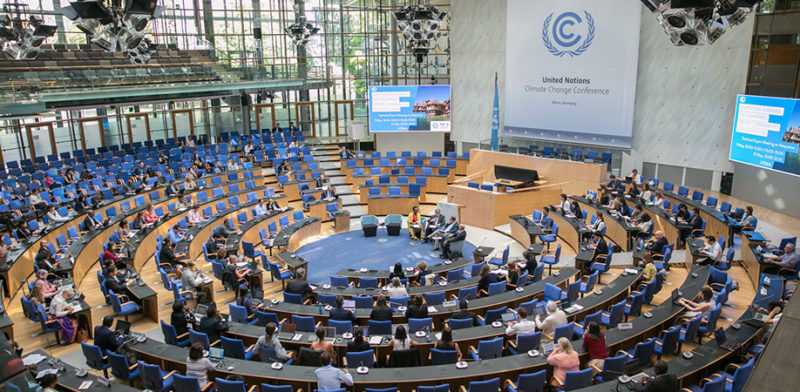Twenty-three nations have formally declared to step up their climate ambition.

The declaration, issued on the sidelines of a week of ministerial meetings on climate change, is said to underscore the urgency for countries to enhance their Nationally Determined Contributions (NDCs) by 2020 in line with the Paris Agreement. The declaration, according to the Climate Action Network (CAN), also puts in place the necessary long-term strategies to reach net zero emissions; and secure the support and investment to ensure effective implementation.
Signatories to the declaration include Argentina, Britain, Canada, Chile, Colombia, Costa Rica, Denmark, Ethiopia, Fiji, Finland, France, Germany, Maldives, Marshall Islands, Mexico, Monaco, the Netherlands, New Zealand, Norway, Rwanda, Saint Lucia, Spain and Sweden.
Positive signals also came from the EU Commission, which announced it would be in a position to increase ambition.
CAN, a global network of over 1,200 non-governmental organisations (NGOs) working to promote government and individual action to limit human-induced climate change to ecologically sustainable levels, has welcomed the declaration, saying that countries now need to walk the talk.
“The International Panel on Climate Change (IPCC) Special Report on 1.5C due to be released in October is likely to confirm that limiting warming to 1.5C is feasible, but hard to achieve. This makes it essential and urgent for all countries to join these front-runners and step up to enhance their NDCs by 2020. The process requires adequate finance to flow to countries that need it to establish the necessary infrastructure for a green and carbon-free economy,” says the group.
It adds: “Around 200 nations collectively made a promise to their citizens in 2015 as part of the Paris Agreement to ratchet up their commitments and targets every five years. This declaration signals a step in the right direction, but many more countries should now similarly indicate they will fully implement the Paris Agreement and enhance their NDCs by 2020.
“These initiatives are important to drive both strong momentum for a positive conclusion of the Talanoa Dialogue and a strong outcome at the upcoming UN talks in Katowice, Poland. 2018 is a very important year to trigger the process of NDC revision by all countries. The political phase of the Talanoa Dialogue needs to result in a strong and universal decision as the first stock-taking exercise of countries’ efforts since Paris was agreed in 2015.
“Indeed the 2019 United Nations Secretary-General Climate Summit is an important milestone but all countries need to commit as early as December 2018 at the UN talks to prepare the ground nationally for raised and updated NDCs by 2020. The countdown has started and if countries start reviewing their NDCs right after COP24, that still only leaves one year to complete the process; that time is needed for multi-stakeholder engagement to build comprehensive and inclusive NDCs involving all actors of society. Governments will only succeed if people are on board.”
Stakeholders have equally welcomed the declaration, even as they called on other countries to join the fray.
Fernanda Carvalho, Climate and Energy Policy Manager, WWF International: “WWF strongly welcomes the step taken by the 23 countries that have signed the declaration but, with the window of opportunity to keep global warming to 1.5°C fast closing, we also need others to act fast. We need rapid and deep cuts to global gas emissions and, as state and non-state actors step up, we urge other countries to enhance and revise their NDCs by 2020.”
David Waskow, International Climate Director, World Resources Institute: “This declaration shows that countries understand the urgency of climate action and are actively looking into making bolder commitments. This is exactly the sort of leadership that we need ahead of the UN climate talks in Poland this December.
“While the IPCC’s Special Report on 1.5 C will be released in several months, the latest climate science already shows that the risks of inaction are dire and every fraction of a degree matters. 2018 is the year for governments to step up and commit to enhancing their national climate commitments, with actions such as greater investments in renewable energy, protecting forests and reducing energy waste.”
Wael Hmaidan, CAN Executive Director: “It is great to see these 23 governments joining the global call to step up climate action. The transition to 100% renewable energy is an economic opportunity for growth and job creation. Now, we need to see if the remaining countries are able to step up their climate ambition and enhance their targets as well by the next climate talks in Poland.”
Wendel Trio, Director, CAN Europe: “This declaration comes at the right time and is a much needed call to scale up climate action from incremental to transformational. It proves that a growing number of countries, including from Europe, recognise that more action is needed if we are to keep the objectives of the Paris Agreement within reach. European countries need to make sure that by the UN Secretary-General Summit in 2019 they are ready to present a new 2030 climate target in line with the commitment to limit temperature rise to 1.5°C.”
